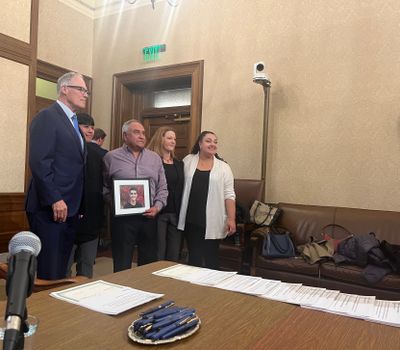Bill to increase the penalty for hazing to honor WSU student signed into law

On Saturday, more than 2,500 WSU Pullman graduates will receive their diploma. Many will strut the stage, clad in black robes, decorated caps and stoles draped over their shoulders.
The day will undoubtedly be marked by fervent celebration from elated grads and their beaming families.
At least one graduate will be missing from the festivities.
Sam Martinez was set to graduate this May along with the rest of the class of 2023, with a degree in business. In 2019, Sam died from alcohol poisoning after being hazed as a pledge in his fraternity.
Sam’s parents, Jolayne Houtz and Hector Martinez, won’t be among the moms and dads to cheer when they hear their child’s name and clap while their son crosses the stage.
But Sam’s legacy is making them proud in a different respect.
Monday, Gov. Jay Inslee signed into law a bill Sam’s family has been championing for two sessions to increase the penalty for hazing.
“It’s definitely bittersweet. I so wish it was my son who was going to be picking up his diploma this week,” Houtz said. “But I feel proud of the fact that hopefully, between this law and Sam’s law, that somebody else’s child will have the opportunity to walk across that stage and get their diploma, even though Sam won’t be.”
The law reclassifies hazing from a misdemeanor to a gross misdemeanor. In cases like Sam’s, where the hazing causes substantial bodily injury, it’s a felony.
Accompanying a gross misdemeanor is up to a year in jail and a $5,000 fine, an increase from the 90 days and $1,000 that comes with a misdemeanor. A felony for hazing would constitute up to five years in jail and an up to $10,000 fine.
“This will improve accountability for those who organize hazing rituals at fraternities and sororities and establish a new and much-needed culture where students understand that hazing is absolutely unacceptable,” Inslee said just before signing the bill.
Opponents of this legislation said increased penalties won’t lead to a reduction in hazing, but instead punish youths whose brains are still developing. Hazing is a cycle that relies on repetition of tradition. Perpetrators of hazing have most likely been hazed themselves, leading them to believe the acts are a normal part of building camaraderie, opponents pointed out.
“We must begin to wean ourselves off the addiction through increased incarceration as the solution to all of our problems,” said David Trieweiler with the Washington Association of Criminal Defense Lawyers.
This bill was the final component in a three-pronged package Sam’s family has promoted in his honor. To “save a life for the one that was taken,” and reduce hazing in Washington, Houtz wanted to address education, transparency and penalties.
Fueled by grief and what she felt was injustice in the legal system, Houtz brought her ideas to Legislators and, in 2020, Rep. Mari Leavitt, D-University Place, got on board. In her first session advocating for the pair of bills, “Sam’s Law” passed last session nearly unanimously and relatively quickly by Legislative standards.
Sam’s law requires institutions to publish a list of investigations in student organizations. Hazing thrives in the shadows, Houtz said, and increasing awareness of the proliferation of hazing contributes to prevention.
“I’m a real believer in sunshine is the best disinfectant,” Houtz said.
Sam’s law also mandates hazing education and prevention training for all staff and students at higher education institutions.
The governor’s signature Monday achieves the final prong: penalty. Though it didn’t pass last year, the penalty bill moved through the Legislature unanimously this year.
Houtz isn’t planning on stopping her advocacy in preventing hazing.
She’s working with a team at the University of Washington to create a comprehensive database of hazing instances nationwide. That way, hazing isn’t hidden from parents and prospective students, like it was when her son was a pledge.
A preliminary version of hazinginfo.org, as the database is called, will launch June 1.
She also vows to keep her eye on the effects of this legislation and return to the Legislature if she feels it needs reform. But for now, Sam’s loved ones are celebrating this bittersweet victory.
“I feel really proud that the state came together around this, that hazing must be stopped,” Houtz said. “It just shouldn’t be something that we’re worried about as parents sending our kids off to college.”